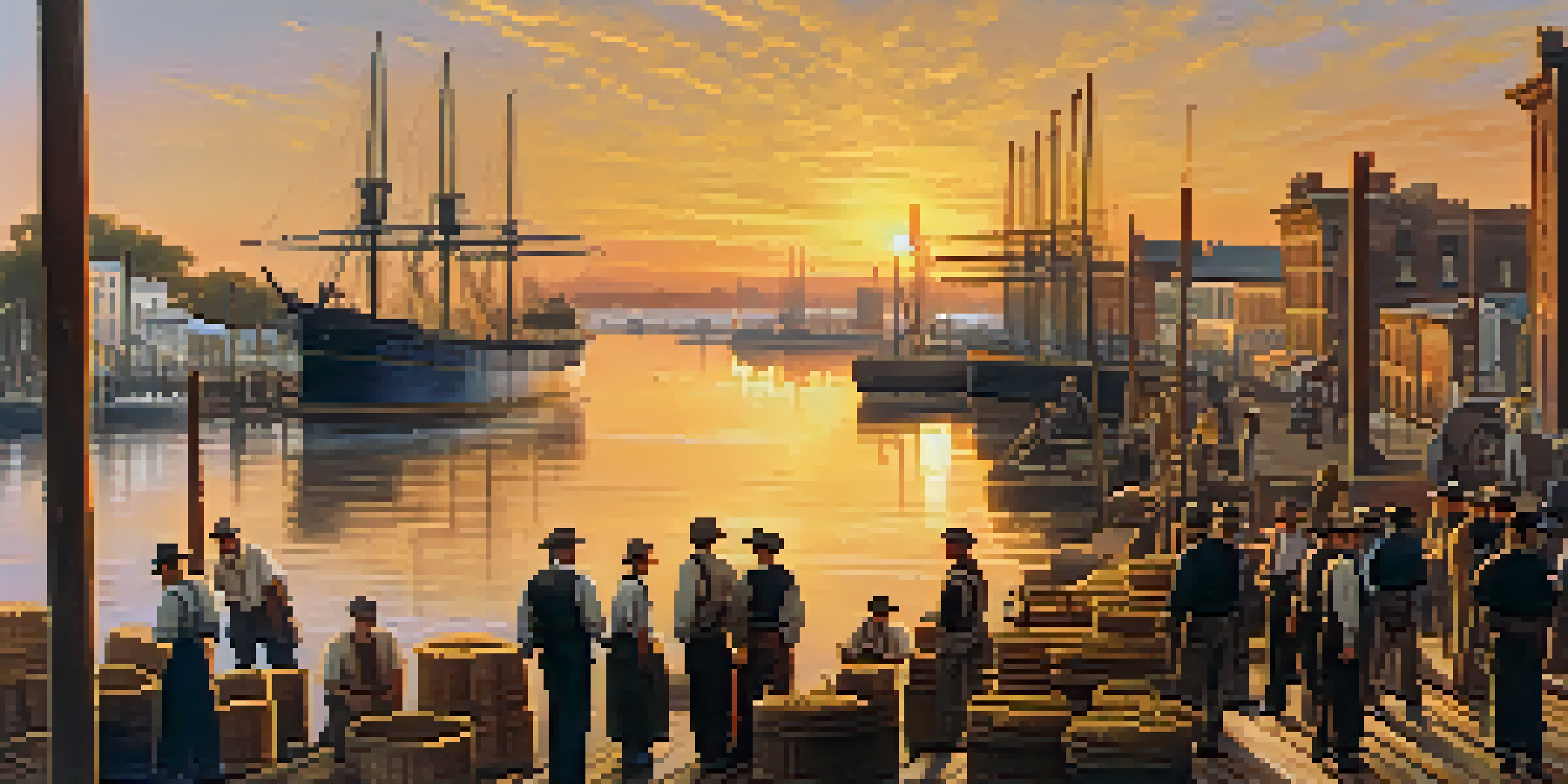The Economic Impact of the Civil War on Savannah

Savannah's Economic Landscape Before the Civil War
Before the Civil War, Savannah was a booming port city, thriving on cotton exports and trade. Its strategic location along the Savannah River made it a crucial hub for shipping goods, particularly to Europe. The wealth generated from the cotton industry created a flourishing economy, with many local businesses and a vibrant community.
The only thing we have to fear is fear itself.
With the invention of the cotton gin and the rise of plantations in the surrounding areas, Savannah's economy was heavily reliant on agriculture, particularly cotton. This agricultural prosperity attracted a diverse population, including merchants, shipbuilders, and laborers, all contributing to an economically robust city.
However, this economic prosperity was built on the backs of enslaved people, whose labor was essential for the cotton industry. This reliance on slavery would soon become one of the central issues leading to the Civil War, setting the stage for significant economic upheaval.
The Outbreak of the Civil War and Initial Economic Effects
As the Civil War broke out in 1861, Savannah's economy faced immediate challenges. The Union blockade aimed to cripple the Confederate supply lines, significantly impacting trade and commerce in the city. Ships that once filled the harbor were now met with empty docks, leading to a sharp decline in economic activity.

Local businesses that relied on trade and shipping began to feel the pinch as goods became scarce and prices soared. Many residents found themselves struggling to make ends meet as the war intensified, leading to a sense of uncertainty and fear throughout the community.
Savannah's Pre-War Economic Boom
Before the Civil War, Savannah thrived as a key port city due to its cotton trade, which fueled a diverse and prosperous economy.
Additionally, the enlistment of men into the Confederate army further strained the labor force, creating workforce shortages in various industries. This combination of factors pushed Savannah's economy into a recession, marking the beginning of a tumultuous period.
The Impact of the Union Blockade on Savannah
The Union blockade around Savannah proved to be one of the most significant factors affecting the city's economy during the war. It restricted not only the import of goods but also the export of cotton, which had been the lifeblood of Savannah's economy. As a result, cotton prices plummeted, causing financial distress for many plantation owners and merchants.
History is not a burden on the memory but an illumination of the soul.
The blockade forced locals to become resourceful, leading to a rise in the production of homemade goods and barter systems. People began to rely on local resources, which sparked a sense of community but also highlighted the dire circumstances they faced.
Though the blockade aimed to weaken the Confederacy, it also led to a shift in the social fabric of Savannah. Families had to adapt to these changes, with many women entering the workforce and taking on roles traditionally held by men, showcasing resilience amid adversity.
Civil War's Toll on Savannah's Infrastructure
As the war progressed, Savannah's infrastructure began to deteriorate under the strain of conflict. Railroads, roads, and bridges that were vital for transportation and supply routes suffered significant damage from military actions and neglect. This breakdown hindered movement, affecting both military logistics and civilian life.
Many buildings and homes were repurposed for military use, leading to a lack of adequate shelter for residents. The local government struggled to maintain essential services, and public health crises began to emerge from overcrowding and scarcity of resources.
Union Blockade's Economic Impact
The Union blockade during the Civil War severely disrupted Savannah's economy, leading to resource scarcity and a decline in trade.
The physical scars left on Savannah's infrastructure would take years to heal post-war. The damage not only impacted the economy but also severely affected the daily lives of its citizens, creating a sense of loss and hardship that would linger long after the war ended.
Post-War Recovery and Economic Changes
The end of the Civil War in 1865 marked a turning point for Savannah's economy, but recovery was slow and complicated. The city faced the daunting task of rebuilding its infrastructure and economy from the ground up, as many businesses had shuttered, and trade routes were disrupted. The transition from a slave-based economy to one that embraced free labor posed significant challenges.
The introduction of the Freedmen's Bureau aimed to assist newly freed individuals, but tensions between different social classes and races complicated the recovery process. Many former enslaved people sought work in the very industries that had previously exploited them, leading to a complex and often fraught relationship.
Despite these challenges, Savannah began to diversify its economy in the post-war years. New industries emerged, and the city slowly regained its status as a commercial center, albeit with a different economic landscape than before the war.
Long-Term Economic Consequences for Savannah
The Civil War left a lasting impact on Savannah's economy that would shape the city's future for generations. The shift from an agriculture-driven economy to a more diversified one laid the groundwork for modern industries to take root. This transformation was crucial in enabling Savannah to adapt to changing economic conditions over time.
Moreover, the war catalyzed social changes that would influence the economic landscape. As new labor practices emerged and the population became more diverse, Savannah began to embrace industries beyond cotton, including manufacturing and tourism, which played a vital role in its economic development.
Post-War Recovery Challenges
After the Civil War, Savannah faced slow recovery and transition from a slave-based economy, ultimately leading to a more diversified economic landscape.
The scars of the war remained, however, as issues of race and inequality continued to affect the economic opportunities available to different communities. Understanding these long-term consequences is essential for grasping how Savannah evolved into the city it is today.
Legacy of the Civil War on Savannah's Identity
Today, Savannah's identity is deeply intertwined with its Civil War history, influencing both its culture and economy. The preservation of historic sites and museums dedicated to this period attracts visitors from around the world, contributing to the tourism industry. These elements of heritage help define Savannah as a city that honors its past while looking toward the future.
The rich history has fostered a sense of pride among residents, who often reflect on the resilience and adaptability of their city. Savannah has become a symbol of transformation, illustrating how a community can rebuild and redefine itself after significant hardship.

As Savannah continues to grow and evolve, the lessons learned from the Civil War era remain relevant. The economic impacts of that tumultuous time serve as a reminder of the complexities of progress and the ongoing journey toward equality and opportunity for all residents.